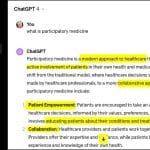This blog welcomes guest posts from SPM members on relevant topics. This is a blog post by Annette McKinnon, an e-patient in Canada. Annette is an enthusiastic advocate for patient inclusion in research and healthcare decision making. She has had rheumatoid arthritis for the past 30 years, and has a background in market research. She attended the Stanford Medicine X Conference in 2014 as an ePatient Scholar, and in 2013 and 2014 was moderator of the Reaching Out With Arthritis Research (#eROAR) tweetchat for the Arthritis Patient Advisory Board of ARC (Arthritis Research Canada).
for the past 30 years, and has a background in market research. She attended the Stanford Medicine X Conference in 2014 as an ePatient Scholar, and in 2013 and 2014 was moderator of the Reaching Out With Arthritis Research (#eROAR) tweetchat for the Arthritis Patient Advisory Board of ARC (Arthritis Research Canada).
She sits on the Board of Directors for the Sjogren’s Society of Canada, and is a volunteer Health Mentor for the Centre For Interprofessional Education in Ontario, a member of Patient Partners in Arthritis and the Canadian Arthritis Patient Alliance. She tweets as @anetto and blogs about health related issues at “Your Gold Watch – Rheutired“
Today I watched a youtube video of the Institute of Health Services and Policy Research (IHSPR) Policy Rounds – Improving Care of Multiple Chronic Conditions The webinar is from March 26, 2014. I found out that in Ontario chronic disease accounted for at least 65% of direct health care costs in 2010/11 and it would not surprise me if that number is typical across Canada. In the US that percentage might not be the same since the health care system is different.
The Steering Committee that set direction for this discussion was composed of government and researchers who chose stakeholders to participate in the discussion about issues and challenges involved in dealing with patients with multiple chronic conditions. They were picked because they could bring unique views and experiences to bear on the challenge and they could champion actions to address the problem creatively within their constituencies. (Michael Wilson, PhD)
The part that really caught my attention was the breakdown of participants involved in the stakeholder dialogue
- 3 Policy Makers
- 9 Managers
- 3 Providers
- 5 Researchers
One of the statements the participants produced stressed collaboration both within teams and also across silos with the emphasis that each silo brings unique value to the overall goal. The plan is to continue to support bottom up and person centered approaches to developing models of care and working across silos.
At this point I’m really wondering why the patient silo is off in this field miles away from the other silos. After all where does the money in the health system come from? There is only one source – the taxpayers. Why are patients not considered valuable stakeholders? If we want to work across silos I think everyone needs to be considered and included.
As much as some health care professionals fear the intrusion of the engaged and educated patient, it seems that policy makers and planners are even more worried about patient inclusion in health care planning. (Apologies to the rheumatology researchers who are including patients)
Among the suggested strategies to accomplish improvement in the treatment of chronic disease is developing a patient centered approach to health care and using patient friendly language. There are now more patients eager to be engaged in their own care; that will help. One of the tools to deal with multiple chronic diseases will be self management. “Using innovative, collaborative approaches to developing and supporting use of self-management tools and resources” as well as including older adults and those with chronic health conditions in random trials are other methods of making progress in this area.
It was a very useful webinar that made perfect sense. But again we don’t see patients included in policy and planning. I feel that this problem is perfectly illustrated by ePatient Dave’s rallying cry “Nothing about us without us.”
With patients seen as the lowest level in healthcare it sounds as though we are perfectly positioned for the new bottom-up strategy.






Recent Comments